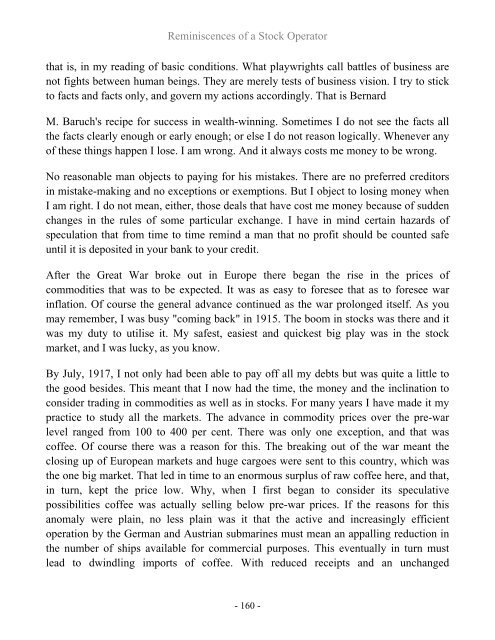Create successful ePaper yourself
Turn your PDF publications into a flip-book with our unique Google optimized e-Paper software.
Reminiscences of a Stock Operator<br />
that is, in my reading of basic conditions. What playwrights call battles of business are<br />
not fights between human beings. They are merely tests of business vision. I try to stick<br />
to facts and facts only, and govern my actions accordingly. That is Bernard<br />
M. Baruch's recipe for success in wealth-winning. Sometimes I do not see the facts all<br />
the facts clearly enough or early enough; or else I do not reason logically. Whenever any<br />
of these things happen I lose. I am wrong. And it always costs me money to be wrong.<br />
No reasonable man objects to paying for his mistakes. There are no preferred creditors<br />
in mistake-making and no exceptions or exemptions. But I object to losing money when<br />
I am right. I do not mean, either, those deals that have cost me money because of sudden<br />
changes in the rules of some particular exchange. I have in mind certain hazards of<br />
speculation that from time to time remind a man that no profit should be counted safe<br />
until it is deposited in your bank to your credit.<br />
After the Great War broke out in Europe there began the rise in the prices of<br />
commodities that was to be expected. It was as easy to foresee that as to foresee war<br />
inflation. Of course the general advance continued as the war prolonged itself. As you<br />
may remember, I was busy "coming back" in 1915. The boom in stocks was there and it<br />
was my duty to utilise it. My safest, easiest and quickest big play was in the stock<br />
market, and I was lucky, as you know.<br />
By July, 1917, I not only had been able to pay off all my debts but was quite a little to<br />
the good besides. This meant that I now had the time, the money and the inclination to<br />
consider trading in commodities as well as in stocks. For many years I have made it my<br />
practice to study all the markets. The advance in commodity prices over the pre-war<br />
level ranged from 100 to 400 per cent. There was only one exception, and that was<br />
coffee. Of course there was a reason for this. The breaking out of the war meant the<br />
closing up of European markets and huge cargoes were sent to this country, which was<br />
the one big market. That led in time to an enormous surplus of raw coffee here, and that,<br />
in turn, kept the price low. Why, when I first began to consider its speculative<br />
possibilities coffee was actually selling below pre-war prices. If the reasons for this<br />
anomaly were plain, no less plain was it that the active and increasingly efficient<br />
operation by the German and Austrian submarines must mean an appalling reduction in<br />
the number of ships available for commercial purposes. This eventually in turn must<br />
lead to dwindling imports of coffee. With reduced receipts and an unchanged<br />
- 160 -


